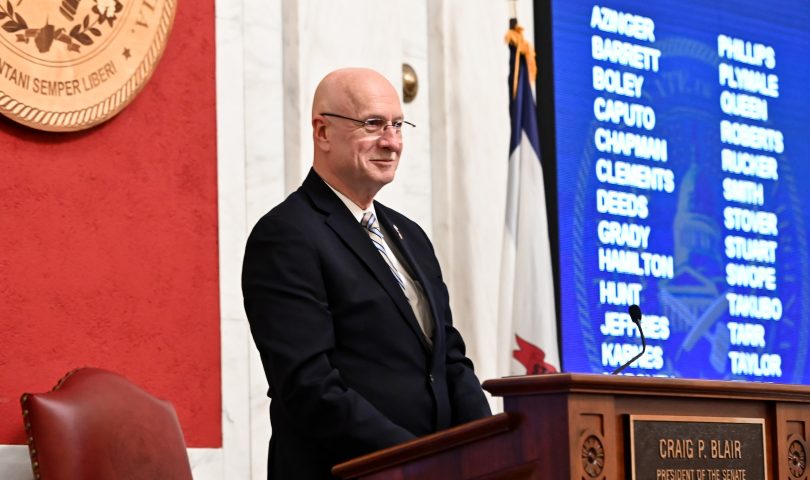MORGANTOWN – Bills to cap insulin copays, give the governor and constitutional officers a raise, and to recognize an unborn child as a distinct victim in a DUI-causing-death crash all passed on the last day of the legislative session on Saturday.
A few other bills failed to cross the finish line.
SB 577 reduces the copay cap of a 30-day supply of insulin from $100 to $35, and sets a $100 cap for devices (a blood glucose test strip, glucose monitor, lancet, lancing device, or insulin syringe; but not insulin pumps). The cost-sharing maximums are aggregate, regardless of quantity or type. A prescription would not be required to obtain a blood-testing kit for ketones.
As it came from the Senate, the bill covered only private insurance and left out PEIA. Delegates adopted a House Health amendment to include PEIA. The Senate took up the bill on Saturday and chose to leave the provision in the bill.
After the final back-and-forths, the House passed it again at 8:49 p.m. and it heads to the governor. It will take effect Jan. 1, 2024.
West Virginians for Affordable Health Care issued a statement praising the bill’s passage.
Executive Director Dr. Jessica Ice said, “This is great news for West Virginians. SB 577 helps West Virginians who have health insurance be able to afford the care they need to stay healthy, avoid expensive health complications and emergencies, and to stay working and productive.”
And Morgantown resident Mindy Salango, who has Type 1 diabetes, said, “Imagine waking up to the prospect of making a heartbreaking choice: Should I pay for rent, or should I risk death by forgoing my medication? Now, imagine having to make this choice relentlessly, without relief, every day. SB 577 will provide diabetics with much needed relief and peace of mind by creating reasonable patient out-of-pocket spending cost caps.”
HB 3135 provides for raises for the governor and other six constitutional officers. It removes the salary scales in code and ties them to federal salary schedules that are updated by the U.S. Office of Personnel Management. House floor discussion noted that these could be recalculated every four years. It will not affect current office holders.
Under the current federal schedule, the governor’s pay would go from $150,000 now to $177,978. The other officers’ pay would rise from $95,000 to $129,269.
The House agreed to Senate amendments, with further amendments, and passed the bill at 11:07 p.m. The Senate took it up, agreed to the House amendments and re-passed it at 11:32 p.m. It goes to the governor.
HB 3302 recognizes an unborn child as a distinct victim in a DUI-causing-death crash.
The House first passed it on Feb. 14. The Senate took it up and passed it on March 6. On March 9, the House refused to concur with the Senate amendments. It went to conference committee on Saturday.
And passage went down to the wire. The committee hashed out the details of their disagreements and the House passed it at 11:18 p.m. The Senate followed at 11:30 p.m. It goes to the governor.
Failed bills
SB 739 came to the House on Friday as a bill to set a 60-day moratorium on carbon offset agreements connected to timber sales. A House amendment toned it down to merely require that any parties who enter into a carbon offset agreement apply to the tax commission for a business registration certificate within 60 days of entering into the agreement, or within 60 days of the bill taking effect, whichever is later. It would apply to existing agreements.
The Senate initially refused to concur with the House amendments, then changed course and at 9:19 p.m. and amended the House amendments and sent it back. The House never took it up and it died.
SB 426 was the TikTok ban and was one of the several bills subjected to legislative ping pong on the last day. The House removed specific references to TikTok, aiming to allow for other emerging technologies. The bill says that the chief information security officer (CISO) will develop standards regarding banned high-risk technology platforms or products. All levels of government — local governments, K-12 schools, higher education, and state entities — must enforce those standards.
Out of concern for separation of powers, the House on Friday amended it to simply recommend that agencies in the legislative and judicial branches adopt the standards and practices put forth by the CISO.
Back in the Senate on Saturday, yet another amendment restored the bill’s applicability to all branches of government and removed the mere encouragement directed at the legislative and judicial branches. They then sent it back to the House. But both sides refused to back down and it died.
Tweet David Beard @dbeardtdp Email dbeard@dominionpost.com




